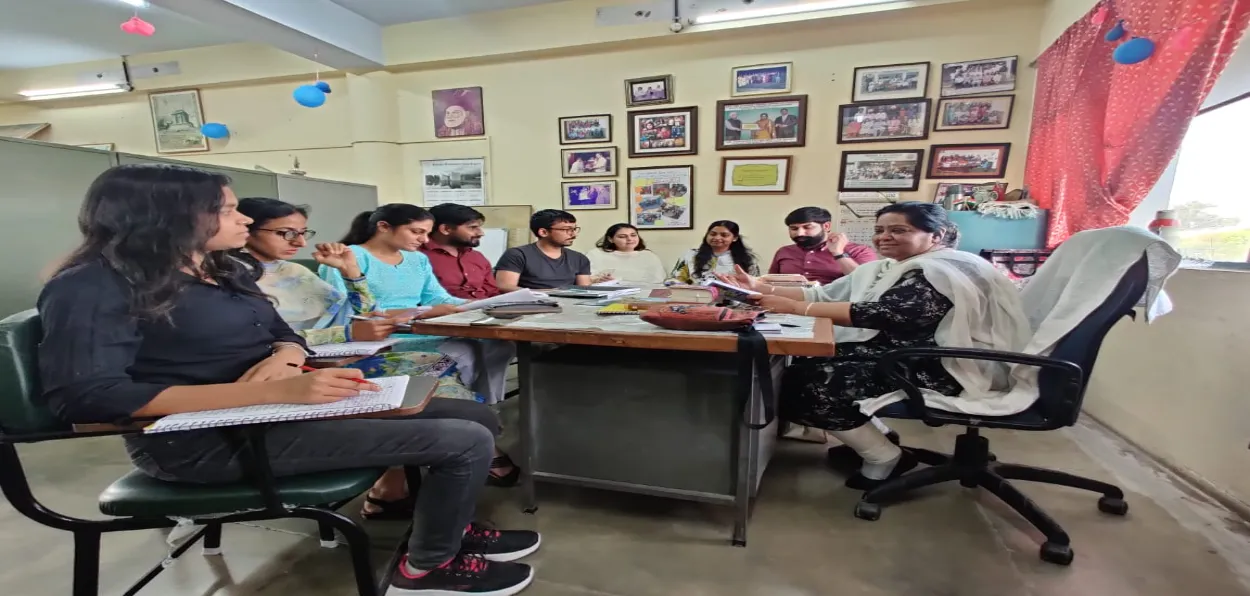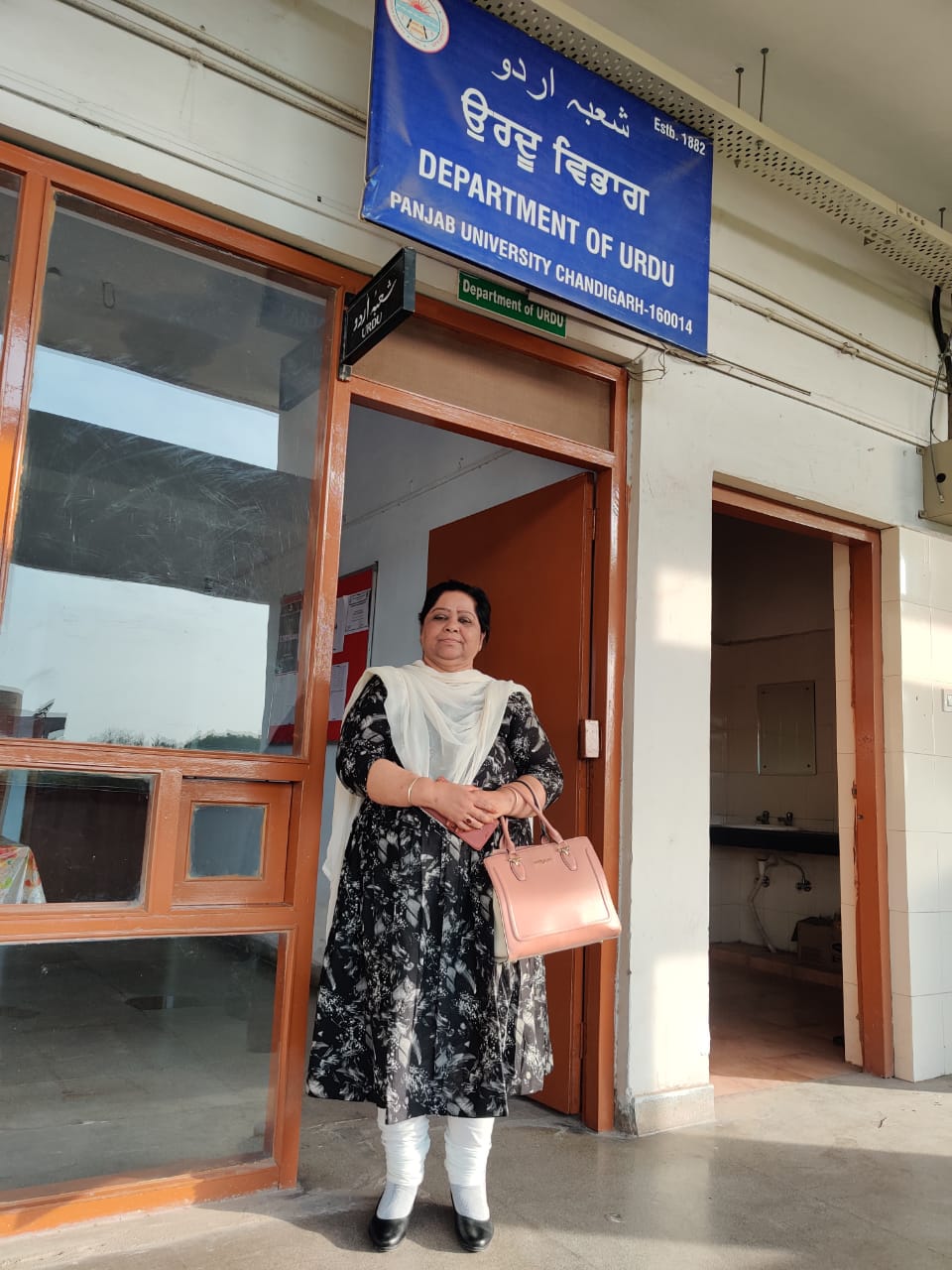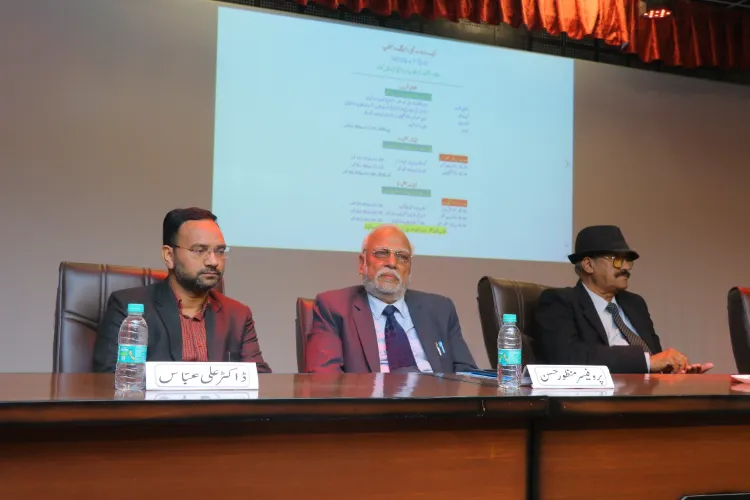
Tripti Nath/Chandigarh
"Is Khaksar ko Dinesh kehte hain. Mai Urdu ka Adna sa talibeilm hun," this is how a young student from Jind in Haryana, gave his ' Taruf' (introduction) during a class in the Urdu department of the prestigious Punjab University.
A picture of the legendary Indian poet Mirza Ghalib on an unmissable spot on the wall of this simple room stands out among other significant pictures and awards.
It is here that Dr Zarreen Fatima, Assitant Professor, teaches Urdu to students and shares space with a Persian teacher. Eight students are sitting around her desk in an informal setting.
Dinesh, a student of diploma course is the only student from Haryana.The class also comprised five students pursuing the first-year certificate course in Urdu. Most of them are from different areas of Punjab where land records are still in Urdu.
Although the students and the teacher deserve a lecture hall, they are making the best of what is available. For many years, the department has been appealing to the university authorities for proper lecture halls. Dr. Fatima says, “Hamare bachchon ko Urdu ki classes ka intezarhota hai’’ (Our students eagerly await their Urdu lessons). “
All these students love Urdu and don't think that it is a dying language.
Although the Urdu department was set up by Dr. Haroon Ayub at Punjab University in 1978, it is yet to be given a proper place. It has been running from three rooms in a wing of the Department of Chemical Engineering.
In the current academic session, 64 students are enrolled in a one-year certificate course and an advanced diploma course. Another 22 are pursuing post-graduation in Urdu.
Dr. Fatima who has been teaching Urdu at Punjab University for 22 years is convinced that Urdu has a bright future. Honoured by the Chandigarh Sahitya Academy for Lifetime Achievement Award in Urdu, in 2020, Dr Fatima says, “ It is wrong to say that Urdu is a dying language.’’
Dr Fatima says: “Urdu faqat zubaan nah,i mere doston, Urdu hamare mulk ki tehzeebbhi to hai.’’ (Urdu is not merely a language, it is also the culture of our country)
She observed, “ Urdu kal bhi bahut zyada Urooj par thi. Kabhi Pasti me nahijayegi.’’ Na mittithi, namittihai, namitegi Urdu, chahnewaalonkehotthon par rahegi Urdu.’’ (Urdu was always at the top. It will never decline. It never got wiped and never will.) Jo sheerini, nazakat, latafat, Urdu me hai, vohkahinnahimilti hain.’’ (The sweetness, finesse and purity that you find in Urdu is matchless)
She claims there is no language better than Urdu to impress people.
Daughter of a famous Khaqanigar (writer of pen portraits) Ghulam Rizvi who was better known by his pen name ‘ Gardish’, Dr. Fatima takes immense pride in the fact that she is his only child to have taken forward his rich legacy.
She says, “I learnt Urdu informally from my father and my mother, Wasim Rizvi who was teaching Urdu in a school in Mau in Azamgarh. Later, I opted for Urdu in college. I was fortunate to get to know some of my father’s friends who were noted writers like Akhtar-ul-Iman, Janesar Akhtar, Ali Jawad Zaidi, Nayar Masood, WamifJaunpuri, FiraqGorakhpuri, and Shams-ur-Rehman Farooqi. I am the first lady in my entire family to have earned a doctorate. I was awarded a doctorate from Shibli College, Azamgarh, in 1993.’’

Dr Zareen Fatima
Dr. Fatima has authored three books in Urdu and believes that Urdu has a lot of scope as most of the land revenue records in Punjab and old legal documents are in Urdu. So, there is always a demand for those who can read and write Urdu.
Jaspreet Kaur Grewal, a 29-year-old student from Sangrur said that Dr. Fatima does not merely teach them Urdu, she teaches them how to live. Jaspreet who works in a law firm said that her interest in Urdu dates back to the time when she was in Class IV. “I had heard my teacher tell us that Urdu is a very sweet language. ‘’
Jaspreet who is pursuing a diploma after completing a certificate course, enlivens the class by reciting couplets She recited, “Ishq hai to ishq ka izhaar hona chahiye, aapko chehre se bhi bimar hona chahiye.’’ (If you are in love, your face should show that you are love sick)
Her classmates welcome her spontaneity with calls of ‘Mukarrar’ (encore).
Honey Sandhu, a 28-year-old student from Ferozepur in Punjab, says he was naturally drawn to Urdu because his grandfather, a farmer, knew Urdu. “I completed my graduation in Business Management. During the lockdown, I began learning Urdu from YouTube. Now, I am preparing for civil services, and learning Urdu is very rejuvenating. I also like listening to Mushaira on YouTube and this is teaching me how to attempt poetry.’’
Dr. Fatima has taught many students including IAS officers. “Madhvi Kataria, a Punjab cadre IAS office, finished her certificate course and diploma course from here. She mastered the language so well that many students wanted to speak like her.’’
Dr Ali Abbas, Head of the Urdu department since 2020, says that Urdu offers plenty of scope. Dr. Ali studied in Shia College, Lucknow and studied History, Persian, and Urdu in Lucknow University. He later taught at Lucknow University and the American Institute of Indian Studies.
Dr Abbas who holds a doctorate in Urdu is determined to ensure that Urdu gets due recognition, " I earn a living from Urdu and the least I can do is to stand up fearlessly to oppose any attempts to diminish its importance. There were many attempts to dislodge us from this department and even categorise it as a foreign langiuage. I opposed the move to place our department in the school of foreign languages. The issue was later resolved.''
Dr. Abbas who had his initial education from a Madarsa in Kopaganj village in the Mau district of Azamgarh, says that Urdu could have never flourished as much anywhere else as it has done in Hindustan. “Urdu Hindustan ki mitti se ban ihai.(Urdu has been moulded by the soil of Hindustan). The Urdu literature we have got today dates back to Amir Khusro and Masood Sad Salman.

Dr Ali Abbas (Extreme left) in a conference
“At that time, it was called Hindvi. Over the centuries, legendary poets like Mirza Ghalib, Meer Taqi Meer, Sir Syed Ahmed Khan, and Mushairas gave Urdu a distinct identity. The best poets in Pakistan today are those who migrated to Pakistan after Partition.”
He says that the number of students seeking enrolment in Urdu has steadily increased over the years.“ When I joined the Urdu Department at Punjab University as Assistant Professor in June 2014, there were only four students enrolled for post graduation in Urdu. It was in 1982 that post graduation was introduced in the Urdu department. In nine years, we are seeing nearly a six-fold increase in the number of students enrolled for post graduation. We try our best to ensure that our students don’t drop out of courses. In 2015-’16, our students began to qualify for UGC NET. Students coming here from Jammu-Kashmir, Punjab and other States are getting good jobs.’’
Dr Abbas said that many students from Punjab tell him that they have chosen to learn Urdu and Persian so that they can read history and literature written in Shah Mukhi and Persian.
He added, “Urdu is an Indian language, and 90 percent universities in India are teaching Urdu. If you survey Andhra Pradesh, Bihar, Maharashtra, Tamil Nadu, and West Bengal, you will find that more than 60 percent of universities there are teaching Urdu. In Punjab alone, besides Punjab University, Punjabi University, Patiala, and Guru Nanak Dev University, Amritsar is teaching Urdu. Many colleges in Malerkotla (Punjab) are also teaching Urdu. Kurukshetra University in Haryana teaches Urdu. Khalsa College in Chandigarh also started teaching Urdu and Persian last year.’’
He said that Urdu is also spoken in Bangladesh, Pakistan, and U.A.E and is now gaining popularity even in Tajikistan.’’
Speaking about work opportunities arising from learning Urdu, Dr. Ali said that there is no dearth of translation-related work in Urdu which he assigns to students from time to time.
ALSO READ: Youth Parliament debate winner Mahira Khan hailed in Saudi Arabia
Dr. Abbas is also invited by the University of Punjab in Lahore, Pakistan for a peer review of their journals and research papers. He was also recently invited by the Department of English at Punjab University to speak on the theme’ How to write Ghazals.’
He says that Urdu has withstood the test of time and its eternal summer will never fade.
